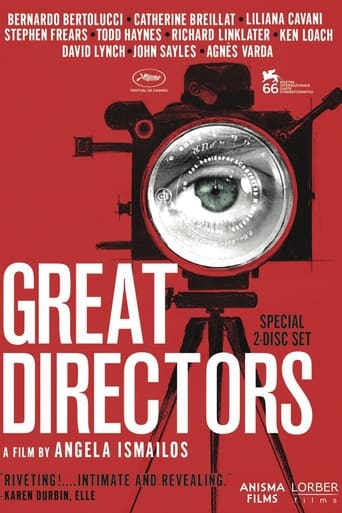

Interesting, but not profound. First problem is that many of the chosen "great" directors are not great, more like semi-famous, and in the cases of David Lynch (since 1997 at least) and Catherine Breillat, mere purveyors of pretentious crap. Where were the true greats (alive in 2009): Woody Allen, Martin Scorsese, the Coen Brothers, Quentin Tarantino, Christopher Nolan, Clint Eastwood, Francis Ford Coppola, Steven Spielberg, among others?Interviewer / narrator is a tad self-indulgent too.Disappointing.
... View More"Great Directors", directed by Angela Ismailos, features conversations with ten of the world's greatest living directors: Bernardo Bertolucci, David Lynch, Liliana Cavani, Stephen Frears, Agnes Varda, Ken Loach, Todd Haynes, Catherine Breillat, Richard Linklater and John Sayles.We get to meet some great talent here. Catherine Breillat may not be well known, but her films are an emotional experience. After seeing this, many people will likely try to track down her work.We find that David Lynch's career was really launched by Mel Brooks. Making "Dune" was a "75% nightmare", which he attributes to not having the final cut. He reflectively sees the failure of "Dune" as a blessing, though, because he could only go up after that. And, with "Blue Velvet", he certainly did go up.You can hear about Ken Loach's socialism and Todd Haynes' "new queer cinema"; Haynes sees Fassbinder as his "template", which is an interesting choice. Fassbinder himself seems to be loved by film geeks and forgotten by almost all others. We also see that Roger Corman protégé John Sayles works sometimes for money, sometimes for love...
... View MoreGreat Directors (2009) *** (out of 4)Angela Ismailos' documentary has her traveling around the world interviewing ten different directors who all bring something different to filmmaking. Bernardo Bertolucci, Catherine Breillat, Liliana Cavani, Stephen Frears, Todd Haynes, Richard Linklater, Ken Loach, David Lynch, John Sayles and Agnes Varda are the ten directors interviewed for the film. Ismailos starts the film off with a brief description of what she was wanting to do and while I'm sure people could debate these ten directors being the greatest living it's really not a big deal because the documentary is really a lot of fun and I think film buffs should really enjoy the conversations. We deal with all sorts of subjects including how the directors fell in love with cinema, their influences, certain mistakes in their careers and their opinions on doing something personal compared to working with Hollywood. Some of the most interesting stories come from Lynch who is pretty open about things and tells some nice stories including how Mel Brooks had to see ERASERHEAD before allowing him to direct THE ELEPHANT MAN. Lynch also talks about his time on DUNE and his feelings on BLUE VELVET and LOST HIGHWAY. Frears is also an interesting subject as he talks about why he had success in America but decided to come back to Britain to make films. The controversial Breillat is another nice subject as she talks about the struggles of making the movies that she does as well as being a female doing it. Fans of these filmmakers will certainly enjoy listening to them go over their careers and there are certainly a lot of interesting ideas discussed.
... View MoreIncredibly difficult not to make a bad pun out of the title...The Great Directors takes 90 minutes to interview great directions, for which there is no discernible criteria. Squeezed into this run time is a bunch of conversations, some much more elucidating than others. Although the typical film buff might be interested to see so many voices collected in one sitting, the film comes off often as incoherent. The director, to quote another review, "awkwardly squeezes herself into one too many frames", often distracting from the real point. It does not help, again as others have noted, she rarely gets to the heart of the matter. Richard Linklater, in his grand total of 5 minutes, talks about the mixed reception of The Newton Boys but it comes more more as smarmy than education. Likewise his talk on growing up poor encouraging him to become an independent filmmaker does not gel well with the more self- effacing wit of a character like Agnes Varda.Sometimes these filmmakers talk about their influences. The documentarian and Todd Haynes agree on the power of R.W. Fassbinder's work and segue into it. It's clear just how much Haynes respects the man but this comes off almost as inconsequential. We don't really hear Lynch or Sayles talk about their formative influences so it leaves one wondering where all these conversations are being generated from. To summarize, one could easily find more interesting material from these filmmakers by watching more personal interviews or.. heck, just watching their movies.
... View More